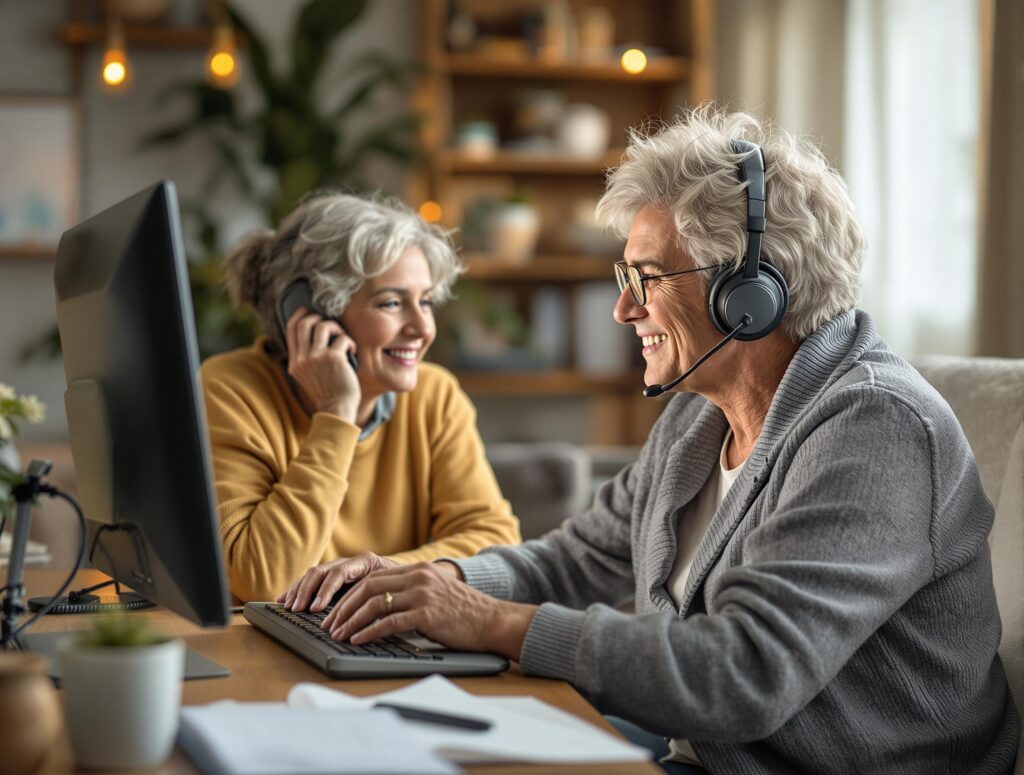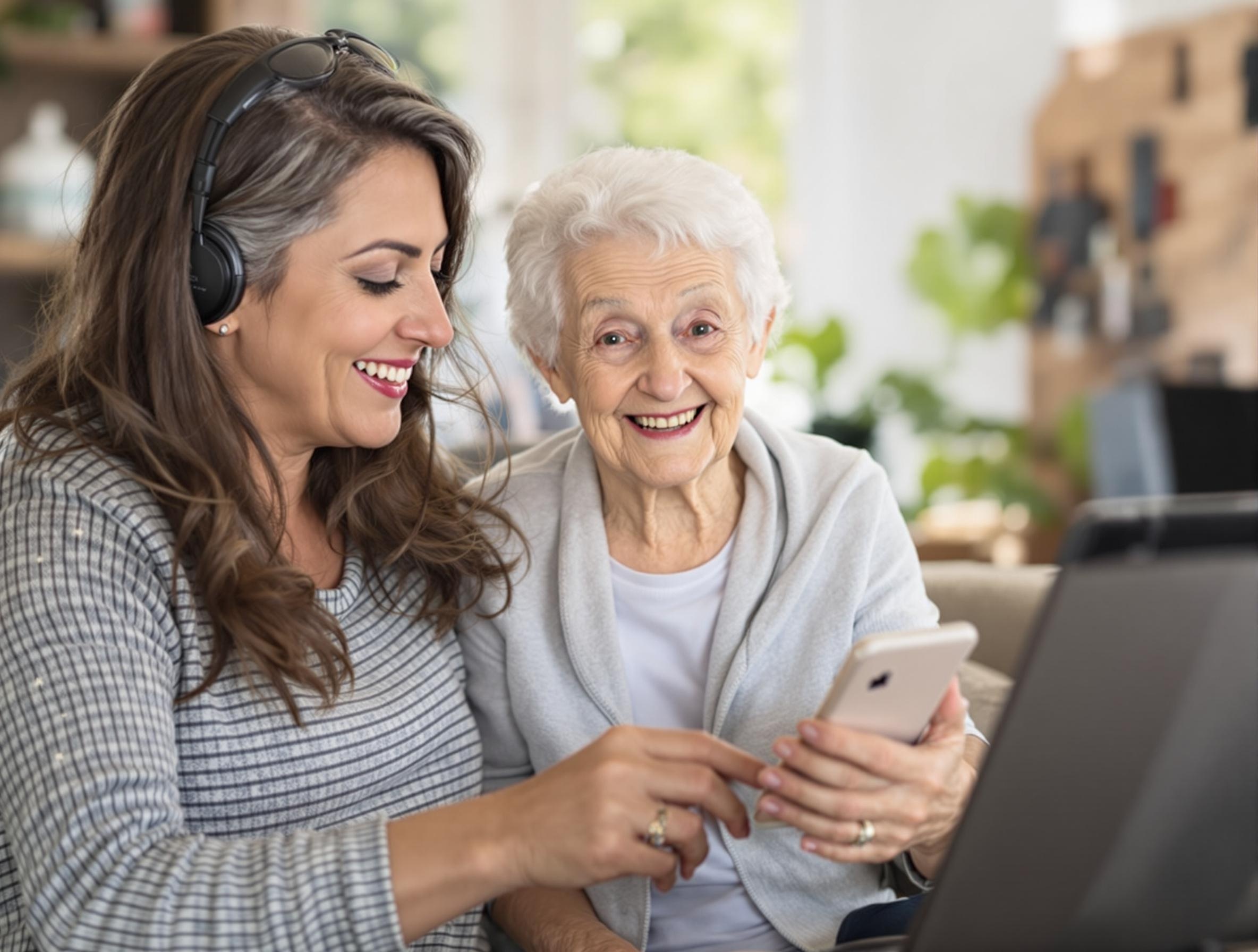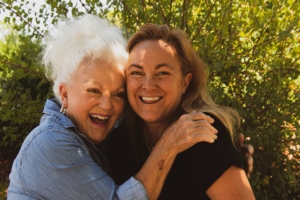When someone you love needs extra support, distance can feel like a heavy barrier. Whether you’re across the state or across the country, long-distance caregiving comes with a unique set of challenges—and a lot of heart. The good news? With a thoughtful plan and the right resources, you can be a steady, supportive presence no matter the miles between you.
1. Build a Local Support Team
You don’t have to do it alone. Identify trusted friends, neighbors, or local family members who can be your “eyes and ears” on the ground. Consider hiring professional help, such as a nurse advocate or home care aide, to check in regularly and update you on your loved one’s well-being. Resource: “Building a Care Team on a Budget”
Pro Tip: Ask your loved one’s healthcare providers if they offer virtual appointments or telehealth check-ins. This allows you to attend important visits and stay in the loop, even from afar. Something simple we do is ask our clients or their someone else accompanying them on the visit to call us via cell phone. Next put us on speaker phone when the doctor comes in the room. We always thank the provider for allowing us to participate in the visit. Access our 1-hour master class on “Building a Care Team on a Budget with our Your Nurse Advocate Now Program.
2. Stay Organized With Technology
Use shared calendars, medication reminders, and digital health records to keep everyone on the same page. Apps like Google Calendar or CareZone can help you track appointments, medications, and tasks. Set up group texts or email chains with your support team for quick updates and coordination. Resource: How to Use Technology in a Caregiving Role.
3. Communicate Early and Often
Schedule regular calls or video chats with your loved one and their care team. Even a short weekly check-in can provide reassurance and help you spot small issues before they become big problems. Don’t forget to check in on their emotional well-being, too—sometimes a friendly voice makes all the difference.
4. Plan (and Prepare) for Emergencies
Make sure you have a list of local emergency contacts, including neighbors, doctors, and the nearest hospital. Create an “Emergency To Go Folder” with important medical information, advance directives, and insurance details. Share copies with your support team so everyone is ready to act if needed.

Image by Sintra: Woman at computer managing healthcare needs of aging parents with long-distance caregiving
5. Visit With Purpose
When you’re able to visit, make the most of your time. Use your trip to review medications, check the safety of their home, and meet with healthcare providers. Bring along a checklist to ensure nothing is overlooked. And, of course, spend quality time together—sometimes, that’s the best medicine of all. Get a fresh look on any changes that may indicate a need to change up the care planning process. In our free checklist, 11 Signs Your Aging Parent May Need Help in the Home, can help you find out just where your aging loved ones might need a bit of help.
6. Take Care of Yourself, Too
Long-distance caregiving can be emotionally taxing. Remember to set boundaries, ask for help, and take breaks when you need them. Joining a caregiver support group—even virtually—can offer encouragement and practical advice from those who understand your journey.
What Can You Manage with Long-Distance Caregiving
Long-Distance Tasks That Make a Real Difference
You might be surprised how much you can handle—even from hundreds of miles away! Here are key ways you can support your aging loved one without being physically present:
Coordinate Medical Appointments:
- Schedule doctor visits, arrange transportation, and join appointments virtually to stay informed and ask questions.
Manage Medications:
- Set up automatic refills, organize pillboxes, and use medication reminder apps. Check in regularly about adherence and side effects.
Oversee Finances & Bills:
- Pay utility bills, manage insurance paperwork, and monitor for signs of financial exploitation.
Hire and Supervise Local Help:
- Research, interview, and hire in-home caregivers or cleaning services. Maintain regular communication with them for updates.
Monitor Health & Safety:
- Use technology like video calls, remote monitoring devices, or medical alert systems to check in on daily well-being.
Stay Connected with the Care Team:
- Communicate with doctors, nurses, and home health aides to stay in the loop about care plans and any changes.
Organize Important Documents:
- Keep digital copies of medical records, advance directives, and emergency contacts accessible to you and trusted helpers.
Provide Emotional Support:
- Regular phone or video calls can help reduce loneliness and keep you tuned in to your loved one’s mood and needs.
Remember, even from a distance, your involvement makes a huge impact. With the right strategies and support, you can be an effective advocate and caring presence—no matter where you are.
____________________________________________________________________________

Sintra Image: Long-distance caregiving responsibilities.
You’re Not Alone
At Your Nurse Advocate Consulting, we understand how overwhelming long-distance caregiving can be. Our team of experienced nurse advocates is here to help you navigate healthcare decisions, coordinate care, and provide peace of mind—no matter where you are.
Need help building your long-distance care plan?
Contact us for a free consultation, or check out our membership options for ongoing support.
Want a checklist to sum this all up for you? We have prepared one for you with this free download you can get right now with just a click. You can view the checklist below.
Thank you for spending time with us this week. We’re so glad to be part of your journey in caring for your aging loved ones. It’s an honor to share resources, insights, and a little encouragement to support you along the way. We look forward to bringing you more helpful tools and compassionate guidance in the weeks ahead. See you back here soon!
With care,
Pam and Linda
Your Nurse Advocates
“Compassionate Care for Aging Adults Along With Peace of Mind for the Family”
Make sure you check out the Free Resource Tab on our website for more help.
Checklist: What You Can Manage with Long-Distance Caregiving
You CAN make a difference, even from afar! Use this checklist to stay organized and proactive while caring for your loved one from a distance.
Medical & Health Coordination
- Schedule and confirm medical appointments
- Join doctor visits virtually (phone or video)
- Communicate with healthcare providers and request updates
- Track medications and refill prescriptions
- Set up medication reminders or pill organizers
- Monitor health status through remote devices (if available)
- Get access to their My Chart or online patient portal
Home & Safety Support
- Arrange for in-home care, cleaning, or meal services
- Organize transportation for errands or appointments
- Set up home safety modifications (grab bars, fall prevention, etc.)
- Check in regularly via phone or video to assess well-being
- Set up grocery delivery services
Financial & Administrative Tasks
- Pay bills and manage finances online
- Handle insurance paperwork and claims
- Watch for signs of financial exploitation or scams
Team & Communication
- Build a local support network (neighbors, friends, community resources)
- Set up a form of communication with family members and share updates regularly (group chat, email thread, shared calendar, etc.)
- Create a group chat or email thread for updates
- Share emergency contacts and care instructions with your team
Emotional Support & Advocacy
- Schedule regular calls or video chats for social connection
- Send cards, photos, or care packages to stay engaged
- Encourage participation in local activities or support groups
Emergency & Documentation
- Keep digital copies of medical records and advance directives
- Maintain an “Emergency To Go Folder” (medications, documents, contacts)
- Know who to call locally in case of urgent needs
Tip: Print this checklist and keep it handy, or share it with other family members and care team members.
Need more support?
Visit Your Nurse Advocate Consulting for resources, personalized consulting, and ongoing guidance.





